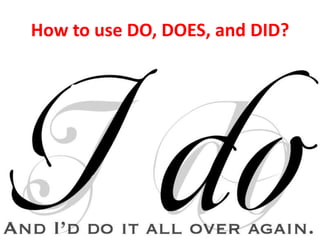Use of Do, Does, and Did
•Download as PPTX, PDF•
5 likes•12,651 views
This document provides instruction on how to properly use the verbs "do", "does", and "did" in sentences. It explains that "do" is used for singular subjects, "does" is used for plural subjects, and "did" is the past tense form. Examples are provided to demonstrate the correct usage of these verbs in different contexts like checking homework, asking questions, and giving reminders. Readers are taught the formula of using the base verb form after "do", "does", or "did". Common errors are highlighted and the document ensures understanding through additional examples and recaps.
Report
Share
Report
Share

Recommended
More Related Content
What's hot
What's hot (20)
Countable & uncountable. some, any, much, many, a lot of, lots of

Countable & uncountable. some, any, much, many, a lot of, lots of
Viewers also liked
Viewers also liked (20)
Q skills 2 grammar review unit 5 auxilliary verbs final 5.4.2013

Q skills 2 grammar review unit 5 auxilliary verbs final 5.4.2013
Similar to Use of Do, Does, and Did
Similar to Use of Do, Does, and Did (20)
Accent reduction by Justin Murray @ REAL LIFE English

Accent reduction by Justin Murray @ REAL LIFE English
More from Kat OngCan
More from Kat OngCan (17)
Use of Do, Does, and Did
- 1. How to use DO, DOES, and DID?
- 2. Choose the statement that you usually use in class. Choose the letter of your answer.
- 3. To confirm the clarity of the lesson: A. Did you understood? B. Did you understand? C. Does you understand?
- 4. To check if they did their assignment: 1. Did you do your homework? 2. Did you did your homework? 3. Did you does your homework?
- 5. A form of reminder: • Did you answer all the questions? • Do you answered all the questions? • Does you answers all the questions?
- 6. When to use DO, DOES, and DID? Verb Subject Do Singular Does Plural Did Past Tense Does not consider the number of the subject
- 7. Let’s Practice: (Do, Does, or Did) 1. Sonia _____ not paint often. 2. My friends also ____ household chores. 3. _____ your family go to the beach last summer? 4. _____ you like watching movies? 5. _____ your mother attend the meeting yesterday?
- 8. What if there is another verb in the sentence?
- 9. Sentence Recap: 1. Did your family go to the beach last summer? 2. Do you like watching movies? 3. Does your mother attend the meeting yesterday?
- 10. What is the formula? DO, DOES, or DID + base form of the verb Which of the following is in base form? Smile Smiles Smiled Am, Is, or Are Smiling
- 11. Let’s Practice: 1. Do you (has, have, had, having) chalk allergy? 2. Does your sibling (help, helps, helped, helping) you in school? 3. Did your family (join, joins, joined, joining) the Fun Run? 4. I don’t always (agree, agrees, agreed, agreeing) with the views of other people. 5. Shiela does not easily (believe, believes, believed, believing) theories.
- 12. Let’s look at the previous statements.
- 13. To confirm the clarity of the lesson: 1. Did you understood? 2. Did you understand? 3. Does you understand?
- 14. To check their assignment: • Did you do your homework? • Did you does your homework? • Did you did your homework?
- 15. A form of reminder: • Did you answer all the questions? • Do you answered all the questions? • Does you answers all the questions?
- 16. Finding Errors • Does the verb agrees with the subject? • Does you use the correct formula in getting your answer? • Did you followed the procedures of the scientific method? • Aside from Rizal, which of the following does you consider a national hero? • How did the painter showed his emotion?